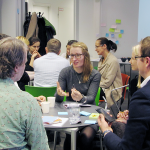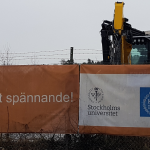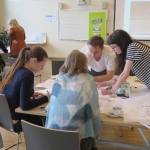While being en route to the goal of improving the quality of study process of universities in Latvia and their international recognition in order to increase the influx of students from abroad, it is crucial to develop a suitable environment for students, similar to many university towns in Western Europe. Pardaugava, part of Riga on the left bank of river Daugava, could join the list of university towns quite soon, because new campuses with organised infrastructure are being developed there. This part of Riga already hosts the Academic Centre for Natural Sciences of the University of Latvia, main buildings of Riga Technical University, as well as Riga Stradins University.
National radio channel Radio Latvia 1 hosted a discussion on its radio programme “How to live better” (original title: Kā labāk dzīvot), during which the necessary actions for developing a campus in Torņakalns (area in Pardaugava), as well the positive impact of this campus on Riga and Latvia as whole, were discussed. The programme hosted following experts: Mr Emils Rode, Project Manager at Riga Planning Region and expert of the project Live Baltic Campus, Prof Indrikis Muiznieks, rector of the University of Latvia, Mr Aigars Locmelis, Deputy Rector for Infrastructure and Development at Riga Technical University, Mr Toms Baumanis, Prorector for Development at Riga Stradins University.
Experts of the discussion unanimously agreed on the fact that the idea of a campus integrated in the urban environment is very feasible and that this campus would hugely benefit to its surroundings, to the reputation of higher education of Latvia, as well as to the economy of Latvia.
As expert of Live Baltic Campus Emils Rode noted that, “unlike a century ago, nowadays one expects more from universities. Today, university is not like an unattainable ivory tower anymore, knowledge is not generated merely on its premises and laboratories, for the new knowledge surrounds us.
Hence, there is a term “knowledge locations”, and the university is like a centre, where the academic, business, and urban worlds meet.” As Mr Rode and the other experts admitted, the logic of knowledgelocations shows that it is necessary to develop a campus, the infrastructure of which is integrated in the urban environment. Secondly, consolidating the study processes in one area is an economically wise step, for it helps to spare resources.
According to the rector of University of Latvia Indrikis Muiznieks, universities must carry out projects of social infrastructure, because, “if one thinks and acts for oneself only, we cannot get any further”. Prof Muiznieks mentioned the recently opened Academic Centre for Natural Sciences as an example of how the tendency of consolidation and cooperation can bring much benefit to universities in Latvia.
Although the Academic Centre is an internal consolidation project, based on economic rationale and objective to create a better study environment for its students of natural sciences’ faculties, it nonetheless develops something similar to a united study space, for its 24/7 library is used by students from RTU and RSU, and foreign students in particular. As professor Muiznieks emphasised, for a more international academic environment in Riga, it is necessary to attract foreign students.
The primary problem that has to be solved is the lack of student accommodation. As Mr Toms Baumanis, Prorector for Development at Riga Stradins University, stated that universities in Latvia have a long way to go to reach the level of world’s top universities, if they currently can provide accommodation only to 1 out of 10 students. The situation, that students co-rent flats and thus isolate themselves from the university environment to some extent, is nothing but a direct consequence of having no campus. As the support from state is insufficient, it is very reasonable for universities to join their efforts and cooperate with the municipality in order to create a united campus.
For a campus to entirely respond to the needs of students, one must not forget about leisure infrastructure, so that the students could spend their free time well.
Mr Aigars Locmelis, representative of Riga Technical University, emphasised that developing facilities and infrastructure for sports is a great solution, while mentioning that the sport infrastructure accessible for the RTU students are being used and that they appreciate the possibility to spend quality time in these facilities.
As regards to the question of how such a campus would benefit Riga and its western part Pardaugava, Mr Rode responded that, unlike the other cities involved in the project Live Baltic Campus, for example Stockholm and Helsinki with their university towns, Riga unfortunately shrinks in terms of population. Universities as hubs of growth and a campus would stimulate the influx of inhabitants, just as it happened with Stockholm. Moreover, as Mr Locmelis mentioned, this academic environment will foster the creation of science and innovation centres in Riga.
Stay tuned for another new project discussion on the Latvian media!
Please listen here for radio discussion!









